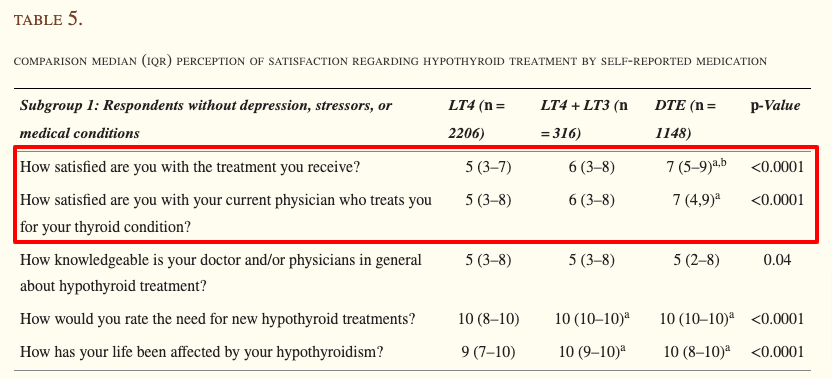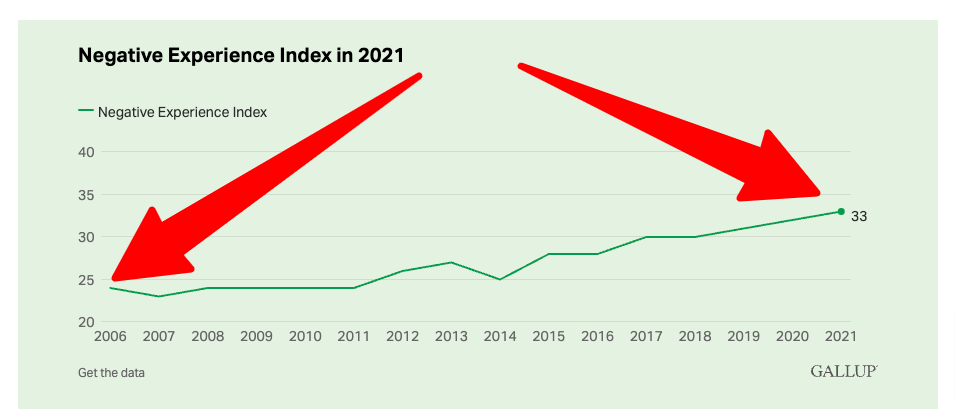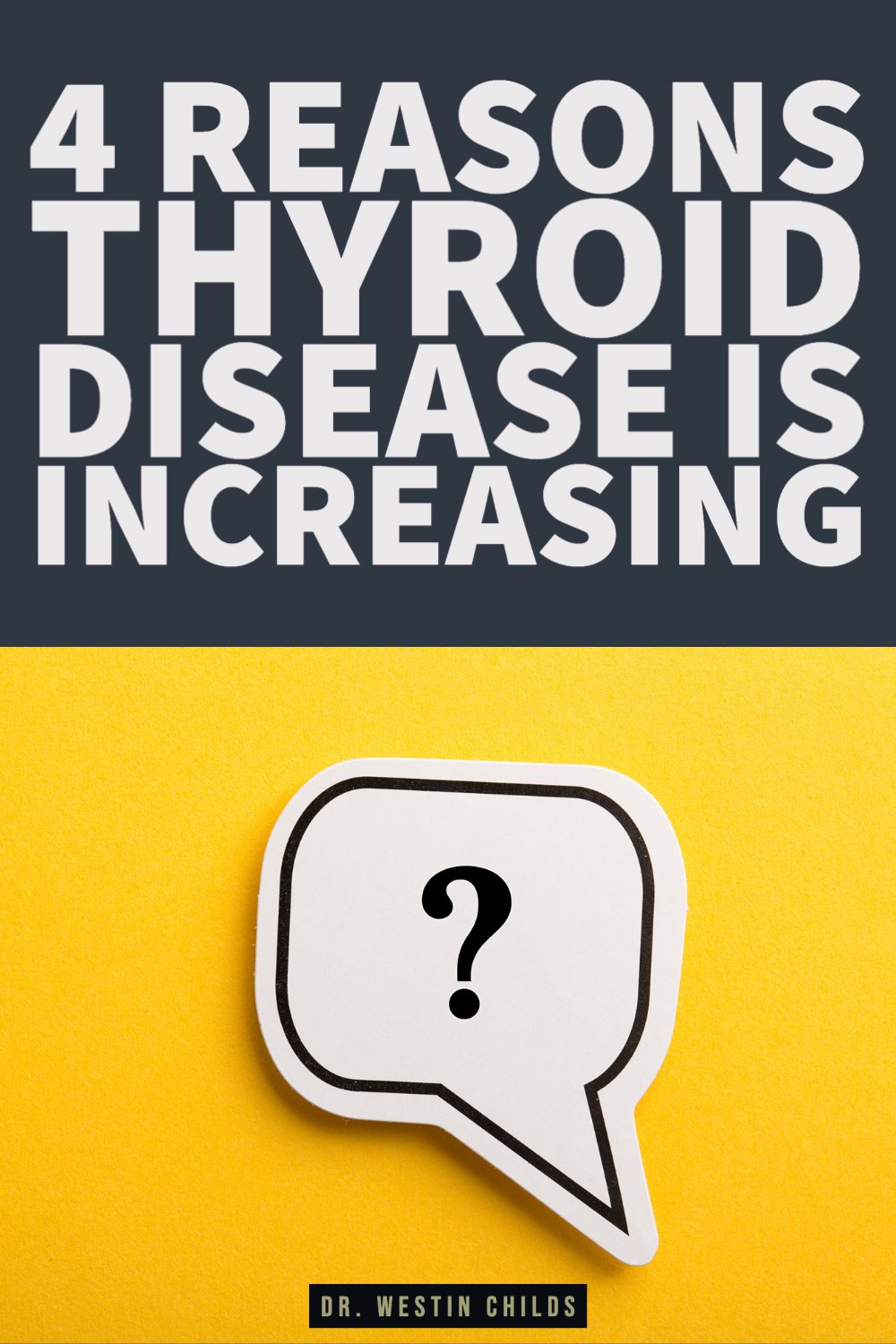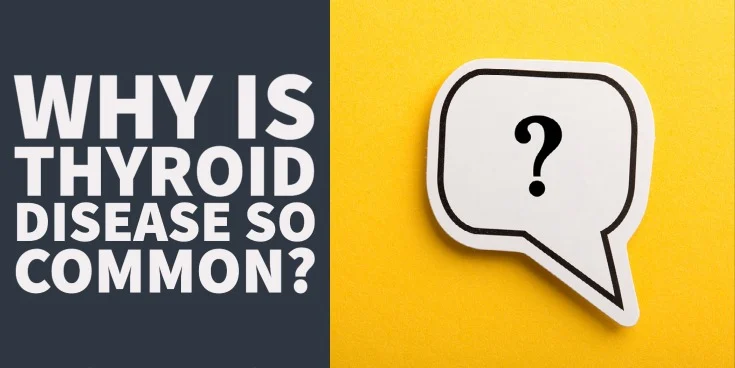One thing is for certain:
The rate of thyroid disease appears to be on the rise.
I say appears because we aren’t 100% sure if it’s actually true, which is why we are going to dive into the topic today.

Believe it or not, it’s difficult to pinpoint how many people out there have thyroid disease but here are a few statistics to put it into perspective:
- It’s been estimated that 1 in 4 adults over the age of 65 (1) have some sort of thyroid dysfunction.
- It’s estimated that 3% of the total U.S. population has a dysfunctional thyroid and that another 14 million Americans are undiagnosed.
- More than 12% of the U.S. population (2) will experience a thyroid condition at some point in their life.
- It’s estimated that 15% of women over the age of 60 years have subclinical hypothyroidism (3).
- It’s estimated that 1-2% of people in the United States have Hashimoto’s thyroiditis.
These numbers are all over the place but if I were to estimate the total incidence of thyroid disease among people in the United States I would put it somewhere around 10-20%.
Regardless of the number, this is a big problem for several reasons…
The first is that, as a whole, thyroid patients tend to be mismanaged.
We know this from patient surveys which show that, on average, thyroid patients rate the quality of their care at an average of 6 out of 10.
Put another way, doctors are failing thyroid patients with this 60% satisfaction rate from thyroid patients.

This isn’t universal as there are many people (perhaps even you) who are well-managed and well-taken care of but when the numbers are averaged, it doesn’t look pretty.
The second is that thyroid disease has huge ramifications on your overall health.
Thyroid disease is associated with heart disease (4), problems with bone health (5), weight gain, mental health, and so on.
Not only are thyroid patients mismanaged but the mismanagement of their condition leads to serious life-affecting diseases and conditions that make living life to its fullest very difficult.
Unsurprisingly, this has led patients to ask why.
Why did they did thyroid disease and not someone else?
What caused their condition and what causes thyroid disease in general?
Is there anything they can do about it to improve their condition?
If you have had any of these questions then you are in the right place.
Let’s discuss…
DOWNLOAD FREE RESOURCES
Foods to Avoid if you Have Thyroid Problems:
I’ve found that these 10 foods cause the most problems for thyroid patients. Learn which foods you should avoid if you have thyroid disease of any type.
The Complete List of Thyroid Lab tests:
The list includes optimal ranges, normal ranges, and the complete list of tests you need to diagnose and manage thyroid disease correctly!
Wait, But Why?
In response to the questions I posed above, we actually know a fair bit about the underlying cause of thyroid disease and it’s not as complicated as you might think.
The basics are well understood for instance, we know that the #1 cause of hypothyroidism in the United States is Hashimoto’s thyroiditis.
No one disputes statements or facts like that.
But there are a lot of controversies when it comes to outlining the exact definition of hypothyroidism based on symptoms and lab tests.
And this controversy exists primarily between conventional medicine and integrative medicine.
The push from the conventional side is to keep a fairly stringent standard of diagnosis for hypothyroidism, one which most certainly will leave many patients undiagnosed and misdiagnosed.
The push from the alternative side is to keep a fairly broad set of requirements for diagnosing hypothyroidism, one which absolutely results in the overdiagnosis of hypothyroidism and thyroid-related diseases.
So which is right?
Is it better to overdiagnose people with thyroid disease and unnecessarily put some of them on thyroid medication to ensure that no one gets missed as the integrative side would have us do?
Or is it better to leave some people underdiagnosed and feeling symptomatic to ensure that only those people who need to be on thyroid medication end up on it as the conventional side would have us do?
As always, the answer is somewhere in the middle.
Regardless of where you sit on this topic, there’s one thing we can all agree on:
We need to make sure we better understand the causes of thyroid disease and why it appears that more and more people are being diagnosed with thyroid conditions so we can either a) prevent it from happening to more people or b) better manage those people who have thyroid problems.
So, with this in mind, let’s talk about the increasing rates of thyroid disease and some possible explanations.
#1. Better Diagnostics.
The first thing you always need to look at when it appears that a disease is increasing is how it is diagnosed.
As you are probably well aware, our ability to detect diseases through testing and new technology is always increasing.
This means that we are becoming better and better at finding diseases when we otherwise wouldn’t have been able to even just a few years ago.
Many doctors will claim that we’ve always had a high incidence of thyroid disease out there but we are just now finding all of those patients through better testing.
I have to admit, I find this argument hard to believe.
Even with third-generation TSH testing (which is very accurate at assessing small changes in TSH levels in the blood), there appears to be a push from the conventional side of medicine to avoid diagnosing thyroid patients until the diagnosis is obvious.

I don’t have any hard data to back up this claim, just the experience I’ve heard from thousands of patients over the last several years.
Regardless, I think it’s pretty safe to say that we can’t blame the increasing rate of thyroid disease on better diagnostics alone.
#2. More Patient Awareness.
Another more compelling argument is that of more patient awareness.
There’s no question that with the dissemination of information from social media, the internet, blog posts, and video, to news articles, thyroid patients are more aware than ever.
From a practical standpoint as someone who creates information on the internet, I can tell you firsthand that videos and blog posts that discuss the symptoms associated with any disease get a lot of likes, comments, and shares.
I’m not clear exactly why this happens but there’s undoubtedly a huge number of people out there who aren’t feeling 100% who appear to be trying to figure out the cause of their symptoms.
This can be both a good and a bad thing.
Good because it means more awareness for patients who otherwise may have gone undiagnosed for many years.
And bad because it has the potential to cause an influx of concern over a disease that may be highly unlikely in a large part of the population.

Let’s take thyroid symptoms as an example:
Symptoms like fatigue, weight gain, and hair loss are common low thyroid symptoms but they are also associated with a huge number of other medical conditions!
You can’t diagnose thyroid disease based on symptoms alone so there may be a lot of people out there who think they have thyroid disease but are really suffering from other medical conditions that just happen to have overlapping symptoms.
Overall, I do believe that patient awareness is a net benefit for the thyroid community even after taking into account some of the potential negatives.
But I still don’t think patient awareness alone is enough to explain the increase in thyroid disease that we are seeing.
#3. More Baseline Stress.
If I were a betting man trying to make an educated guess on why thyroid disease is increasing, I would bet money that the next 3 topics we are about to discuss are likely at the heart of the problem.
The first is stress.
Many people discount the huge impact that stress can have on their overall health and they do so at their own peril.
A little bit of stress is a good thing, but we don’t live in an environment where a little bit of stress is the norm.
No matter where you are in your life, you are under a constant barrage of stressors that can build up in your system and lead to many problems including thyroid dysfunction.
Your body has built-in mechanisms to tolerate stress.
This idea is often referred to as your allostatic load (6).
If you think of stress as liquid and your ability to tolerate stress as a bucket, your body has the ability to tolerate a certain amount of stress up to a set limit.
This limit is set by all sorts of things including your personality, your genetics, the supplements you are taking, your lifestyle, and so on.
Regardless of the size of your bucket, once that bucket is filled your stress will switch from being beneficial to being harmful.
And when that happens is when you start to experience pathology which may include thyroid dysfunction.
Just how common is this problem? My experience suggests that stress may be one of the most common triggers for thyroid-related problems including Hashimoto’s.
There really isn’t a good way to test for this so we have to run on expert opinion and patient experience but I know I’m not alone in suggesting that stress may be one of the primary triggers of thyroid disease.
This also explains why thyroid disease may be increasing.
Do you think that our society is becoming less stressed out or more stressed out over time?
I think it’s pretty clear that, as a whole, we are more stressed than ever before.
Whether that’s because of pressure from social media, pressure from a 24/7 news cycle, economic concerns, global concerns, mental health concerns, or whatever, people nowadays are more stressed than ever before.
This idea is backed up by polls which show that people are experiencing more negative experiences than ever before (7) (up ~30% from 15 years ago).

The good news is that stress can absolutely be managed and it should be a priority for anyone trying to prevent thyroid disease or for those who already have thyroid disease.
#4. Higher Exposure to Endocrine Disruptors.
Another overlooked cause of thyroid disease is exposure to endocrine disruptors.
For whatever reason, the community as a whole tends to underappreciate the impact that chemicals have on their body and overall health.
This is probably because whenever you take about toxins or chemicals, the discussion of detoxification isn’t far behind.
And it’s the discussion of detoxification that causes you to lose a lot of people.
But you don’t have to take it into the realm of detoxification to appreciate the impact that endocrine-disrupting chemicals have on your hormones and your thyroid.
Major medical societies like the Endocrine Society have come out with detailed explanations (8) as to how and why these chemicals cause thyroid problems.
The scientific data is out and it’s not pretty.
Exposure to these chemicals is particularly harmful because they are mostly imperceptible to us as humans and because their negative impact occurs at the cellular level.
Here’s an example of what I’m talking about:
It’s been shown that thermal receipts (the kind you get from the grocery store) contain bisphenol A at doses that are 250 to 1,000 times greater than that found in canned food (9).

It may sound like a problem until you realize that some of this chemical is absorbed through your skin when you touch receipts and that bisphenol A is a known endocrine and thyroid disruptor.
So, yes, it’s very possible that everyday activities may be causing hormone and thyroid problems without you even realizing it.
This exposure is probably not an issue for most people, but when you expose the right person with the wrong genetics to chemicals that have anti-thyroid effects, you may precipitate thyroid disease in that person.
There’s no question in my mind that the exposure and the build-up of these chemicals is one cause behind increasing rates of thyroid disease in the general population.
#5. General Weight Gain & Unhealthy Lifestyle
Lastly, I can’t understate the importance of lifestyle on thyroid disease and overall health in general.
And by lifestyle I am referring to what I consider to be the four most important factors:
- Diet
- Stress
- Sleep
- Exercise
If you are reading this then you should take a cold hard look at how you are doing in each of these areas.
Are you sleeping 8 hours each night? Are you exercising at least 3-4 times each week for a minimum of 20 minutes?
Are you eating a whole-food diet 90% of the time?
Are you actively managing your stress and actively trying to reduce your exposure to stress?
If you aren’t then it’s time to make some changes!
We know from research that failing to take into account any of these factors will lead to thyroid dysfunction.
Eating processed foods? That can cause thyroid problems (10).
Not exercising regularly? That can hurt your thyroid (11).
Not managing your stress? That can cause thyroid problems (12).
Not sleeping? That can also cause thyroid problems (13).
These are the least sexy of all of the potential topics we’ve discussed so far but they are also probably the most important.
It’s my belief that when you combine the impact of a poor lifestyle, exposure to chronic stress, and the impact of chemicals on thyroid function, you will find why thyroid disease is more common now than ever before.
Conclusion
Is the rate of thyroid disease actually increasing? It depends on who you ask but if you were to ask me then my answer would be yes.
I don’t think that better testing and more patient awareness can completely explain the increase we are seeing but they most certainly play a role.
Lesser known factors such as stress, lifestyle, and exposure to chemicals are likely playing a much bigger role than most people realize.
Now I want to hear from you:
Do you think that the incidence of thyroid disease is increasing?
Were you recently diagnosed with thyroid problems or have you had them for a long time?
Do you have an idea as to what triggered yours?
Are you planning on making any changes to your lifestyle after reading this?
Leave your questions or comments below!
Scientific References
#1. nature.com/articles/s41598-019-49540-z
#2. weillcornell.org/news/understanding-thyroid-problems-disease
#3. ncbi.nlm.nih.gov/pmc/articles/PMC5804806/
#4. ncbi.nlm.nih.gov/pmc/articles/PMC7092768/
#5. ncbi.nlm.nih.gov/pmc/articles/PMC3169869/
#6. ncbi.nlm.nih.gov/pmc/articles/PMC6430278/
#7. news.gallup.com/poll/394025/world-unhappier-stressed-ever.aspx
#8. pubmed.ncbi.nlm.nih.gov/26544531/
#9. pca.state.mn.us/business-with-us/bpa-and-bps-in-thermal-paper#/
#10. pubmed.ncbi.nlm.nih.gov/35234772/
#11. ncbi.nlm.nih.gov/pmc/articles/PMC9258892/
#12. pubmed.ncbi.nlm.nih.gov/15650357/
#13. ncbi.nlm.nih.gov/pmc/articles/PMC8848531/









